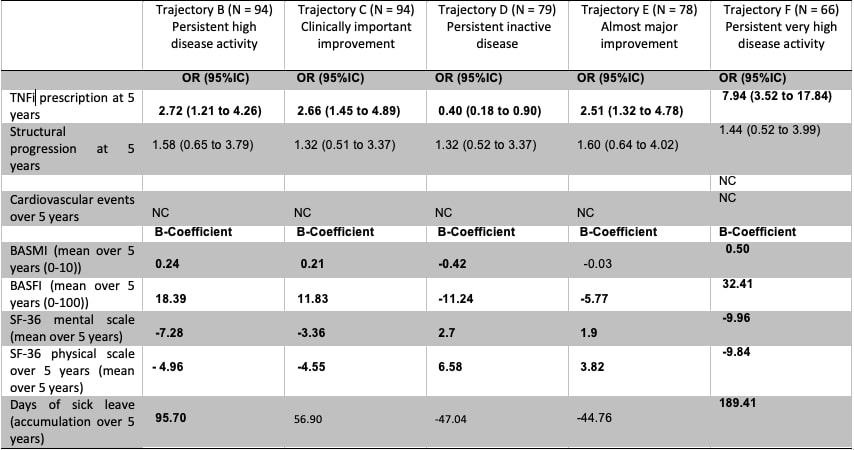Session Information
Date: Monday, November 9, 2020
Title: Spondyloarthritis Including Psoriatic Arthritis – Basic Science Poster
Session Type: Poster Session D
Session Time: 9:00AM-11:00AM
Background/Purpose: AxSpA is a heterogeneous disease, leading to different treatment and follow-up modalities depending on the presentation, along with other elements (socio-economic, gender, etc..). In a previous work, we identified some disease activity trajectories in early axSpa, but we did not evaluate the long-term impact for patients in terms of outcomes such as function, work impairment or structural progression.
Objectives: To identify and describe different trajectories of activity over 5 years in patients with early axSpA and to determine the impact of each on long-term outcomes.
Methods: Prospective, multi-centre study (DESIR cohort) of patients with early inflammatory back pain suggestive of axSpA.
Disease activity trajectories were identified using the k-means method, which provides longitudinal clusters. Baseline characteristics were described and the probability to be associated with one Trajectory assessed by a multinomial regression.
Long term outcomes such as TNFi prescription, function (BASFI), work impairment, quality of life (SF36 scale) and structural progression, associated with each trajectory were identified using mixed models.
Results: 633 patients were included. Six trajectories of disease activity were identified: Trajectory A (n=140 patients, 25.4% of all patients): ‘Moderate disease activity’; B (n=94, 17.1%) : ‘Persistent high disease activity’; C (n=94, 17.1%) :‘Clinically important improvement’ (improvement of 1.36 points on the ASDAS between baseline and year 5) ; D (n=79, 14.3%) :‘Persistent inactive disease activity’; E (n=78, 14.2%) :‘Almost major improvement’ (improvement of 1.8 points) ; F (n=66 (12%) : ‘Persistent very high activity’.
The ‘Persistent low disease activity’ Trajectory was set as the reference trajectory: a university level of education was found to be predictive of belonging to the ‘Inactive disease’ trajectory (OR=3.04, 95% confidence interval [1.46 to 6.78]). Male gender (OR=2.99 [1.56 to 5.92]), and a history of articular peripheral involvement (OR=4.34 [2.14 to 9.10]) were predictive of belonging to the ‘Almost major improvement’ trajectory, whereas a low degree of education (OR=0.27 [0.14 to 0.52]), and female gender (OR=2.01 [1.03 to 4.34])were associated with the ‘Persistent very high disease activity’ trajectory.
All trajectories were associated with a higher TNFi prescription. Higher activity trajectories were associated to other poorer outcomes : the ‘Persistent very high disease activity’ and ‘Persistent high disease activity’ Trajectories presented respectively a mean of 189 and 95 more days of sick leave over 5 years than the reference Trajectory, but also significantly lower SF-36 scores, poorer BASFI and BASMI. However, no higher likelihood of structural progression was observed in high disease activity groups.
Conclusion: We identified 6 trajectories of ASDAS-CRP. Gender, a university level of education, and peripheral joint involvement were the main factors differentiating trajectories at baseline. Higher disease activity trajectories were significantly associated with poorer function, more days of sick leave, and poorer quality of life. Interestingly, no Trajectories were found to be predictive of structural progression.
 Figure : Trajectories of disease activity in early axial spondyloarthritis according to k-means technique. ASDAS, Ankylosing Spondylitis Disease Activity Score.
Figure : Trajectories of disease activity in early axial spondyloarthritis according to k-means technique. ASDAS, Ankylosing Spondylitis Disease Activity Score.
 Table : Outcomes associated with distinct disease activity trajectories in early axial spondyloarthritis (mixed model)
Table : Outcomes associated with distinct disease activity trajectories in early axial spondyloarthritis (mixed model)
To cite this abstract in AMA style:
Leslie B, Molto A, Gossec L, Matthieu R. Different Disease Activity Trajectories in Early Axial Spondyloarthritis Lead to Significantly Different Long-term Outcomes : A Cluster-based Analysis of the DESIR Cohort [abstract]. Arthritis Rheumatol. 2020; 72 (suppl 10). https://acrabstracts.org/abstract/different-disease-activity-trajectories-in-early-axial-spondyloarthritis-lead-to-significantly-different-long-term-outcomes-a-cluster-based-analysis-of-the-desir-cohort/. Accessed .« Back to ACR Convergence 2020
ACR Meeting Abstracts - https://acrabstracts.org/abstract/different-disease-activity-trajectories-in-early-axial-spondyloarthritis-lead-to-significantly-different-long-term-outcomes-a-cluster-based-analysis-of-the-desir-cohort/
